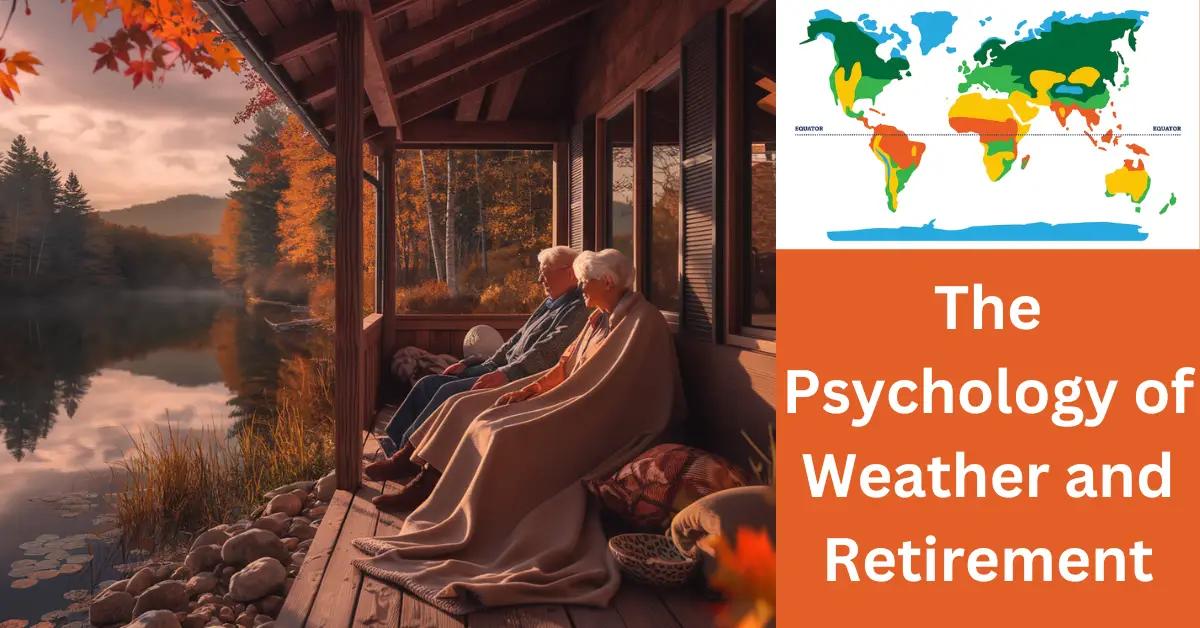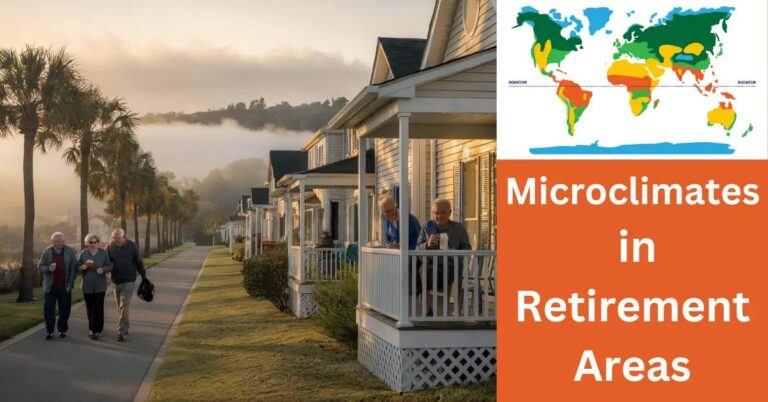TL;DR:
- Weather heavily influences retirement location decisions, with warmer climates inviting outdoor activities and cooler ones offering quieter lifestyles.
- Climate affects living costs, health, and well-being; warmer areas might have higher cooling expenses, and colder regions higher heating costs.
- Adaptability to climate is crucial for seniors, affecting their health and social interactions.
- Climate has psychological effects; sunny climates may enhance mood, while harsh weather can lead to challenges like SAD (Seasonal Affective Disorder).
- Ideal retirement climates balance warmth and low humidity, supporting social activities and minimizing health risks.
- Cultural and climatic factors shape retirement choices, influencing comfort and community sense.
- Retirees should integrate climate considerations in health planning, working with healthcare providers to manage climate-related health outcomes.
Have you ever wondered why retirees often move to warmer places? Weather can greatly shape your retirement life, affecting everything from healthcare access to mental health. Join me as we explore how sun or snow influences your golden years and plans. We'll dig into the intriguing link between weather and retirees' well-being, revealing how simple climate changes can alter life satisfaction and emotional resilience.
How Does Weather Impact Retirement Decisions?
Weather holds great power over our lives, especially during retirement. One common question is, how does weather affect retirement planning? Here's the short answer: Weather significantly impacts where retirees choose to live. A warmer climate may attract those longing for more outdoor activity, while cooler areas might appeal to those wishing for quieter settings. But retirement isn't just about climate preferences alone.
Now, let's explore these choices further. Choosing a retirement location often involves weighing the climate against personal needs. Warm, sunny places might seem like paradise, but they can bring new challenges, like health concerns or higher living costs. Meanwhile, colder places could offer more affordable living but may not cater to everyone’s health or social desires.
Managing financial planning also comes into play. Weather can affect living expenses, from heating and cooling costs to health care needs. For instance, retirees might need to plan for air conditioning costs in hotter climates, such as those found in Florida. In contrast, heating bills could climb in chillier spots, like parts of Canada. These expenses can squeeze a retiree's stable budget, especially if unplanned.
Healthcare access ties deeply into this equation. Warm regions tend to attract older adults, possibly leading to a flood in healthcare demand. If you retire to such places, ensure local health services meet your needs. Weather holds a quiet power, shaping both daily life and long-term well-being.
Retirement's psychological effects also intertwine with weather. Environmental changes, such as relocating to a different climate, can challenge mental wellness. A familiar climate might provide comfort, reducing stress and making the transition smoother. Weather, at first glance, seems a simple choice of preference. In reality, it wraps itself around every part of retirement, impacting where we live, how we feel, and how we plan for the future.
What Are the Psychological Effects of Climate on Retirees?
The climate can greatly affect mental health in retirees. Different climates bring unique experiences for seniors. People often wonder, "What are the psychological effects of retirement?" Retirement impacts mental well-being, but climate also plays a role. Warm, sunny places may boost mood and energy. On the other hand, regions with harsh weather might bring challenges.
Environmental satisfaction can deeply influence happiness. Some retirees thrive in vibrant natural settings. Green spaces or sea views can enhance joy and reduce stress. Enjoying the environment is crucial for retirement happiness.
Weather changes can affect a retiree’s mood. Serene, stable climates often provide a calming effect. In contrast, frequent bad weather may lead to mood swings. Understanding these changes helps retirees make informed choices about where to live.
Sunny climates often provide psychological benefits. Vitamin D from the sun is a natural mood booster. More sunlight can mean more outdoor activities. This keeps retirees active and engaged. Social interactions often improve in these settings.
On the flip side, some seniors suffer from Seasonal Affective Disorder (SAD). This disorder is common in places with long, dark winters. Symptoms may include sadness and lack of energy. Managing SAD might involve light therapy or vitamin supplements. Recognizing and treating symptoms can greatly improve quality of life.
In conclusion, climate has a powerful effect on retired life. Choosing a comfortable environment is important. Factors like mental health and mood variations should guide this choice. Learn more about the psychology of climate and retirement by exploring resources online. By understanding the impact of climate, retirees can enjoy a happier, healthier life.
Why Is Adaptability to Climate Critical for Seniors?
How do seniors adapt to new climates? Seniors adapt to new climates by learning survival skills. This includes dressing in layers for cold or wearing light clothes in the heat. They might need to adjust their daily routines, like walking in the morning or evening to avoid midday sun. Seniors often help each other by sharing tips and experiences about coping with weather conditions.
What factors make climate adaptability a challenge for the elderly? Adaptation can be hard because of existing health problems and decreased mobility. Cold weather can cause joint pain for some, while heat might lead to exhaustion. Traveling far or carrying heavy items can be tough, especially in harsh climates. Limited access to transportation can also impact how seniors adapt to a new climate.
Adaptability helps retirees enjoy their new surroundings and stay healthy. Seniors who adapt well tend to have a better emotional response to changing weather. They can enjoy outdoor activities, which keeps them engaged and happy.
The science of climate psychology provides ways to understand this adaptability. It shows us how climate affects our mood and health. By learning about this, retirees can prepare for changes better. Knowing weather patterns can ease the stress of a new environment.
Enhancing emotional resilience to weather is key for aging people. Taking part in social events helps ease feelings of loneliness. Finding friends who enjoy the same activities creates bonds. Joining local clubs or groups offers support and entertainment. This community feeling is vital for mental strength.
Overcoming climate-related obstacles is possible with planning. This involves packing the right clothes and having essential supplies at hand. Seniors need to learn about local weather patterns before moving. Staying informed allows them to make better decisions and stay comfortable. It also helps in coping with unexpected weather changes, ensuring a smoother transition into retirement life.
What Are the Best Climates for a Fulfilling Retirement?
When thinking about where to retire, climate is key. A warm, sunny climate can lift your spirits, while cold, damp weather might bring you down. So, where is the best place to retire with climate change? The best climates balance warmth and low humidity. Think of places with mild winters and gentle summers. These climates can keep you active and content as you age.
But climate is not the only concern. You must also consider the cost of living. A warm place with low living costs can mean a happy and affordable retirement. Research shows that your environment affects your mood and well-being. That's why it's vital to choose wisely.
Geography also plays a role in your retirement experience. Some regions offer vibrant retiree communities, perfect for social activities. Others provide quiet solitude, ideal for relaxation. As you plan, think about what you want from your new home. Some climates support gardening or golf; others are great for water sports.
Choosing the right retirement community is akin to matching your environment with your lifestyle. Each place has unique offerings, from dining choices to nature trails. Visit communities to see how they align with your interests. A place that matches your likes and hobbies can improve your quality of life.
The psychological wellness benefits of preferred climates are not just about feel-good sunshine. A stable climate can lead to fewer weather-related risks. Risks such as storms or extreme heat can stress the mind and body. Retirement is about finding peace and joy. By picking the right climate, you set the stage for a happy retirement.
In deciding where to retire, choose communities and climates that meet your needs. With the optimal retirement locations and your desired lifestyle, you can enjoy a fulfilling retirement.
How Can Retirees Plan for Climate-Related Health Outcomes?
How does weather affect health in retirement? The key risks come from heat, cold, and storms. For retirees, these climate factors can lead to heat exhaustion, cold-related issues, or injuries.
Retirees should consider climate-related health outcomes. Extreme weather changes can impact blood pressure and breathing. Respiratory issues and heart problems often arise with sudden climate shifts. Warm, stable climates may help seniors with joint and mood issues.
Geographic shifts due to weather change can influence health. Moving to milder climates may reduce health risks. But, sudden exposure to new climates can stress the body. Retirees must adapt their routine to the local climate to avoid health problems.
Integrating climate considerations into health plans is smart. Retirees can work with doctors to address climate-related health needs. Regular check-ups help track health changes due to weather variations.
Assessing climate risks specific to the elderly is crucial. Outdoor hazards rise as age increases. Hot, humid places can worsen dehydration and fatigue. Cold, icy conditions can lead to falls and fractures. Planning for these risks ensures retirees maintain their well-being.
Psychological wellness in preferred climates needs evaluation. Seniors thrive in places aligning with their preference for sunshine or cooler temperatures. Some retirees experience improved mental health in sunny places. Sunlight promotes vitamin D production, lifting mood and energy levels.
Analyzing climate-driven health benefits is important. Studies suggest that warm climates benefit mental health, while stable climates help with arthritis and pain. Understanding how weather influences well-being aids retirees in selecting places that suit their needs.
Evaluating these climate aspects aids seniors in making informed decisions. Retirees should remain aware of weather risks and plan accordingly to enjoy a healthy retirement.
How Do Cultural and Climatic Factors Influence Retirement Decisions?
When retirees choose a place to settle, cultural and climate aspects are key. What role do cultural factors play in climate selection? They shape our comfort and connection to a place. Many retirees want a climate that reminds them of where they felt happiest. This connection helps them feel at home and part of the local community.
How do retirees perceive climate variability? Some find new climates challenging, but others thrive on diversity. Moving to a new climate can be exciting or daunting based on personal history and health. Understanding these reactions helps in choosing where to spend retirement.
There's a special connection between culture and climate that affects retirement choices. For example, people from warm regions often seek similar warmth, even if it means moving far away. This demographic preference shows how experiences with seasons and environments shape desires. Understanding these preferences helps find the right match.
Social networks also play a huge role when adapting to a new climate. Cultural adaptation helps manage climate dissonance. Having friends and a support group eases the transition and improves satisfaction with the new environment. These social bonds can boost adaptability and create a sense of belonging.
Moving to a new climate can deeply impact mental health. It requires adjusting not just physically but emotionally too. Integrating into the local culture can make this transition smoother, creating a sense of balance and purpose in retirement. Embracing new social norms and activities can mitigate feelings of displacement.
To plan effectively, retirees rely on various tools and strategies. Empowerment through climate-informed retirement planning involves researching locations and considering health conditions, social factors, and personal preferences. Critical thinking about climate-related factors helps ensure a fulfilling and satisfying retirement journey. Retirement planning always benefits from understanding the intimate link between culture and climate.
Conclusion
Weather deeply influences retirement choices, touching health, finances, and mental wellness. Choosing the right climate balances needs and adaptability, boosting satisfaction. By understanding climate's psychological effects, retirees can enhance their well-being. Adapting to new weather builds resilience and enriches experiences. Consider climate in health planning to ensure long-term happiness. Cultural and climate factors shape retirement in profound ways, offering opportunities for new beginnings. Embrace these insights for a rewarding, fulfilling retirement journey.












